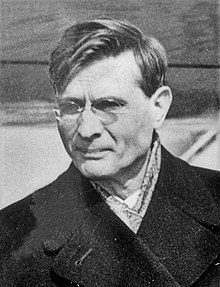Mikhail Suslov
| Mikhail Suslov Михаил Суслов |
|
|---|---|
 |
|
| "Second Secretary" and "Chief Ideologue" of the Communist Party of the Soviet Union | |
|
In office 1965~1970 – 25 January 1982 |
|
| Preceded by | no predecessor |
| Succeeded by | Aleksandr Yakovlev |
| Head of the Department for Relations with Foreign Communist Parties of the Central Committee | |
|
In office 16 April 1953 – 1954 |
|
| Preceded by | Vahan Grigoryan |
| Succeeded by | Boris Ponomarev |
| Editor-in-chief of Pravda | |
|
In office 1949–1950 |
|
| Preceded by | Pyotr Pospelov |
| Succeeded by | Leonid Ilichev |
| Head of the Propaganda Department of the Central Committee | |
|
In office 20 July 1949 – 27 October 1952 |
|
| Preceded by | Dmitri Shepilov |
| Succeeded by | Nikolai Mikhailov |
| Head of the Propaganda and Agitation Department of the Central Committee | |
|
In office 17 September 1947 – 10 July 1948 |
|
| Preceded by | Andrei Zhdanov |
| Succeeded by | Post abolished (merged into the Propaganda Department) |
| First Secretary of the Stavropol Regional Committee of the Communist Party | |
|
In office 1939 – November 1944 |
|
| Preceded by | Dmitry Goncharov |
| Succeeded by | Aleksandr Orlov |
| Full member of the 19th, 20th–21st, 22nd, 23rd, 24th, 25th, 26th Politburo | |
|
In office 12 July 1955 – 25 January 1982 |
|
|
In office 16 October 1952 – 5 March 1953 |
|
| Member of the 18th, 19th, 20th–21st, 22nd, 23rd, 24th, 25th, 26th Secretariat | |
|
In office 24 May 1947 – 25 January 1982 |
|
| Member of the 18th Orgburo | |
|
In office 18 March 1946 – 14 October 1952 |
|
|
In office 13 April 1946 – 12 March 1949 |
|
| Preceded by | Georgi Dimitrov |
| Succeeded by | Vahan Grigoryan |
| Personal details | |
| Born |
Mikhail Andreyevich Suslov 21 November 1902 Shakhovskoye, Russian Empire |
| Died | 25 January 1982 (aged 79) Moscow, Russian SFSR, Soviet Union |
| Resting place | Kremlin Wall Necropolis, Moscow, Russian Federation |
| Citizenship | Soviet |
| Nationality | Russian |
| Political party | Communist Party of the Soviet Union |
| Spouse(s) | Yelizaveta Alexandrovna Suslova |
| Children | Revolii (born 1929) and Maya (born 1939) |
| Residence | Kutuzovsky Prospekt |
| Alma mater | Plekhanov Russian University of Economics |
| Profession | Civil servant, economist |
| Awards |
|
Mikhail Andreyevich Suslov (Russian: Михаи́л Андре́евич Су́слов; 21 November [O.S. 8 November] 1902 – 25 January 1982) was a Soviet statesman during the Cold War. He served as Second Secretary of the Communist Party of the Soviet Union from 1965, and as unofficial Chief Ideologue of the Party until his death in 1982. Suslov was responsible for party democracy and the power separation within the Communist Party. His hardline attitude toward change made him one of the foremost anti-reformist Soviet leaders.
Born in rural Russia in 1902, Suslov became a member of the All-Union Communist Party (Bolsheviks) in 1921 and studied economics for much of the 1920s. He left his job as a teacher in 1931 to pursue politics full-time, becoming one of the many Soviet politicians who took part in the mass repression begun by Joseph Stalin's regime. Suslov impressed the Soviet leadership to such an extent in the pre-Eastern Front Soviet Union that he was made First Secretary of Stavropol Krai administrative area. During the war, Suslov headed the local Stavropol guerrilla movement. He became a member of the Organisational Bureau (Orgburo) of the Central Committee in 1946 and, four years later, was elected to the Presidium (Politburo) of the All-Union Communist Party.
Suslov lost much of the recognition and influence he had earned following the reshuffle of the Soviet leadership after Stalin's death. However, by the late 1950s, Suslov had risen to become the leader of the hardline opposition to Nikita Khrushchev's revisionist leadership. After Khrushchev was ousted in 1964, Suslov supported the establishment of a collective leadership. He also supported inner-party democracy and opposed the reestablishment of the one-man rule as seen during the Stalin and Khrushchev Eras. During the Brezhnev Era, Suslov was considered to be the Party's Chief Ideologue and second-in-command. His death on 25 January 1982 is viewed as starting the battle to succeed Leonid Brezhnev in the post of General Secretary.
...
Wikipedia
